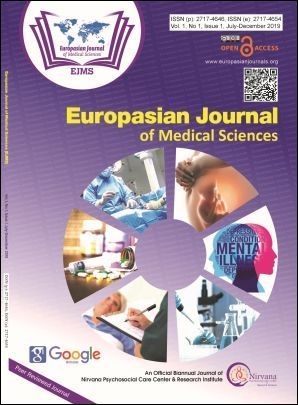Effects of BMI and Food Habits on Menstrual Characteristics among Adolescent Girls
Keywords:
Menstruation, Menstrual Cycle, Menstrual Problem, Food Habits, Nursing Students, Food and Menstrual Cycle, Obesity, BMIAbstract
Background: Menstruation, a normal physiological process in a woman’s body is affected by dietary habit and it can arise different menstrual disorders. The aim of this study is to find out the menstrual health status of young female and its association with their food habit.
Methods: A cross-sectional study was conducted among the nursing students of Maharajgunj Nursing Campus from March 2019 to September 2019.. Pretested and semistructured questionnaire was used to collect the data regarding menstrual history, dietary habit, fast food intake, and food skipping behavior. HEAT (Healthy Eating Assessment Tool) Score was used to assess the food habit and the Visual Analogue Scale (VAS) was used to assess the intensity of dysmenorrhea.
Result: Data was collected among 140 students. The mean age was 24.56±2.65 years. The study showed that 87.9% had problems, and 80.7% have dysmenorrhea. The occurrence of the menstrual problems was more in the participants who were having a non-vegetarian diet than in a vegetarian diet which was statistically significant (p<0.001). Similarly, 68.6% of the participants eat fast food and 91.6 % of them have menstrual problems. Meal skipping habit was found to significantly associated with the menstrual problems (P=0.03). Similarly, 105 (75%) of the participants had good food eating habits, and 32 (22.9%) of the participants had a poor eating habit. The poor eating habit was significantly associated with menstrual problems. The intensity of dysmenorrhea was more in the participant having a nonvegetarian diet. Further, the pain was more severe among the participants who consume tea and coffee more frequently.
Conclusion: The menstrual problems were the alarming problems in the adolescent college going girls of Kathmandu Valley. BMI and excessive intake of junk/fast food, alcohol and tea/coffee had a significant association with menstrual problems.
Downloads
Downloads
Published
How to Cite
Issue
Section
License
Copyright (c) 2019 Authors

This work is licensed under a Creative Commons Attribution 4.0 International License.
The author(s) retain the ownership of the copyrights for their work published in EJMS without any restrictions. Upon submission, the author(s) grants EJMS a license to publish, including to display, store, copy, and reuse the published content.
License to Publish
By submitting a manuscript to EJMS, the author(s) grant the journal a non-exclusive license to:
- Publish and distribute the content in all formats, media, and platforms (both existing and future), while identifying EJMS as the original publisher.
- Reproduce, display, and store the content in both print and online formats, including institutional and digital repositories.
- Translate, adapt, and summarize the work, including reprints, extracts, and abstracts.
- Develop derivative works based on the original content.
- Include the work in electronic databases and provide links to third-party materials.
Creative Commons Licensing
In addition to EJMS’s publishing rights, authors grant third parties the right to use, share, and distribute their work under the Creative Commons Attribution 4.0 (CC BY 4.0) International License. This allows unrestricted use of the content, provided proper attribution is given to the original author(s) and the journal.

